
Sergei Fyodorovich Bondarchuk was a Soviet and Russian actor and filmmaker who was one of the leading figures of Soviet cinema in the 1950s, 1960s and 1970s. He is known for his sweeping period dramas, including War and Peace (1966-67), his internationally acclaimed four-part film adaptation of Leo Tolstoy's novel, and for Waterloo (1970) a Napoleonic War epic.

Zoya Anatolyevna Kosmodemyanskaya was a Soviet partisan. She was executed after acts of sabotage against the invading armies of Nazi Germany; after stories emerged of her defiance towards her captors, she was posthumously declared a Hero of the Soviet Union. She became one of the most revered heroines of the Soviet Union.
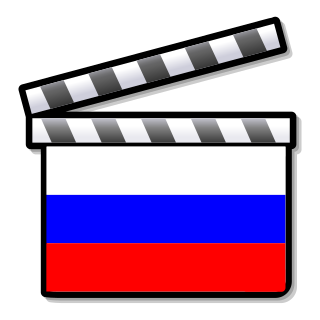
The cinema of Russia, popularly known as Mollywood, refers to the film industry in Russia, engaged in production of motion pictures in Russian language. The popular term Mollywood is a portmanteau of "Moscow" and "Hollywood".

The Cranes Are Flying is a 1957 Soviet war drama film directed by Mikhail Kalatozov at Mosfilm, written by Viktor Rozov, and starring Aleksey Batalov and Tatiana Samoilova. It depicts the cruelty and the damage done to the Soviet psyche as a result of the Second World War, which was known in the Soviet Union as the Great Patriotic War.
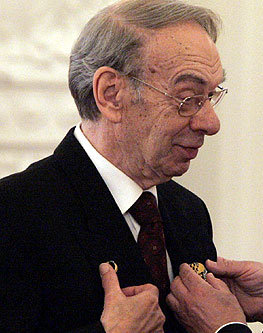
Aleksey Vladimirovich Batalov was a Soviet and Russian stage and film actor, film director, screenwriter, and pedagogue acclaimed for his portrayal of noble and positive characters. He was named a People's Artist of the USSR in 1976 and a Hero of Socialist Labour in 1989.
![<i>Walking the Streets of Moscow</i> 1964 [[Soviet Union]] film](https://upload.wikimedia.org/wikipedia/en/6/65/Shagayu.jpg)
Walking the Streets of Moscow is a 1964 Soviet film directed by Georgiy Daneliya and produced by Mosfilm studios. It stars Nikita Mihalkov, Aleksei Loktev, Yevgeny Steblov and Galina Polskikh. The film also features four People's Artists of the USSR: Rolan Bykov, Vladimir Basov, Lev Durov, and Inna Churikova. The famous movie theme, performed by Mikhalkov, was written by the composer Andrey Petrov. The film, regarded as one of the most characteristic of the Khrushchev Thaw, premiered at the 1964 Cannes Film Festival and won a prize for the work of cameraman Vadim Yusov, best known for his subsequent collaboration with Andrei Tarkovsky.
Zoya is a feminine Russian, Belorussian and Ukrainian first name, a variant of Zoe, meaning "life", from Greek ζωή (zoē), "life".
Katya is a feminine given name. It is a very popular name in Russia, Ukraine, Bulgaria, Serbia, and North Macedonia. It is a Russian diminutive form of Yekaterina, which is a Russian form of Katherine. The name is sometimes used as an independent given name in the English-speaking world. In German, Dutch and Scandinavian languages it is spelled Katja. Katya may also refer to:
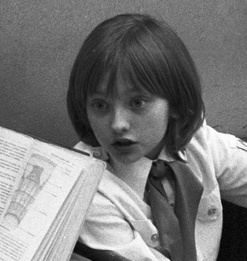
Yekaterina Alexandrovna Lycheva, also known with her first name abbreviated to Katya, is a Soviet-born Russian woman who served as a child "Goodwill ambassador" to the United States in 1986. She also acted in a number of Soviet films for children. She was born in Moscow.

Soviet women played an important role in World War II. While most worked in industry, transport, agriculture and other civilian roles, working double shifts to free up enlisted men to fight and increase military production, a sizable number of women served in the army. The majority were in medical units.
![<i>Heroes of Shipka</i> 1955 [[Soviet Union]] film](https://upload.wikimedia.org/wikipedia/en/2/2d/Geroite_na_Shipka.jpg)
Geroite na Shipka is a 1955 Soviet Union/Bulgarian co-production historical drama film. It tells the story of the famous Battle of Shipka Pass during the Russo-Turkish War of 1877–78. The production companies behind the film are Boyana Film, Bulgar Film and Lenfilm.

Lev Oskarovich Arnshtam was a Soviet film director and screenwriter. He directed nine films between 1936 and 1967. Arnshtam was named People's Artist of the RSFSR in 1969.

A Big Family is a 1954 Soviet drama film directed by Iosif Kheifits. It was entered into the 1955 Cannes Film Festival. It was based on Vsevolod Kochetov's novel Zhurbiny.

When the Trees Were Tall is a 1961 Soviet romantic drama film directed by Lev Kulidzhanov. The film was screened at the 1962 Cannes Film Festival.
Counterplan is a 1932 Soviet drama film directed by Sergei Yutkevich and Fridrikh Ermler.

Aleksandr Anatolyevich Kosmodemyansky was a Soviet military officer and Hero of the Soviet Union, who was bestowed this title posthumously after having been killed in World War II during the capture of the settlement of Vierbrüderkrug, in the Kaporner Heath near Metgethen, just west of Königsberg, East Prussia, Nazi Germany.
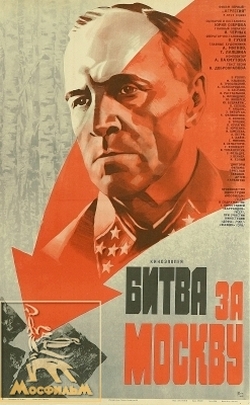
The Battle of Moscow is a 1985 Soviet two-part war film, presenting a dramatized account of the Battle of Moscow during the Second World War, and the events preceding it. The two films were a Soviet–East German–Czechoslovak–Vietnamese co-production, directed and written by Yuri Ozerov. It was made in time for the 40th anniversary of the Allied victory over Nazi Germany and the 20th anniversary of the proclamation of the Victory Day holiday and Moscow's declaration as a Hero City.
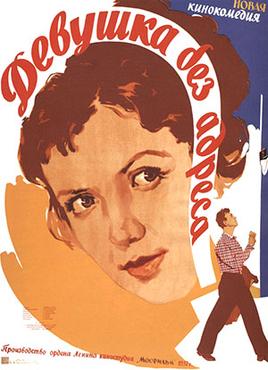
The Girl Without an Address ) is a 1957 Soviet romantic comedy film directed by Eldar Ryazanov and written by Leonid Lench. It stars Svetlana Karpinskaya and Nikolai Rybnikov.

Tatyana Savelyevna Marinenko was a Soviet partisan and intelligence officer of the NKVD during the Second World War. After she was captured and tortured by the Germans in 1942 she was posthumously declared a Hero of the Soviet Union on 8 May 1965.
Elena Borisovna Dobronravova was a Soviet and Russian actress. Born July 21, 1932 in Moscow in the family of artists of the Moscow Art Theatre Boris Dobronravov (1896-1949) and Maria Yulievna Dobronravova (1900-1964). She studied at the Moscow Art Theatre School (1950-52) at the Moscow Art Theatre named after Maxim Gorky. In 1954 she graduated from the Boris Shchukin Theatre Institute. After education Dobronravova joined the troupe of the Vakhtangov Academic Theater. Actress made her film debut in A Big Family (1954) and won Best Acting Award at 1955 Cannes Film Festival as part of ensemble. She's known for many roles in films, television and stage productions.






![<i>Walking the Streets of Moscow</i> 1964 [[Soviet Union]] film](https://upload.wikimedia.org/wikipedia/en/6/65/Shagayu.jpg)


![<i>Heroes of Shipka</i> 1955 [[Soviet Union]] film](https://upload.wikimedia.org/wikipedia/en/2/2d/Geroite_na_Shipka.jpg)






